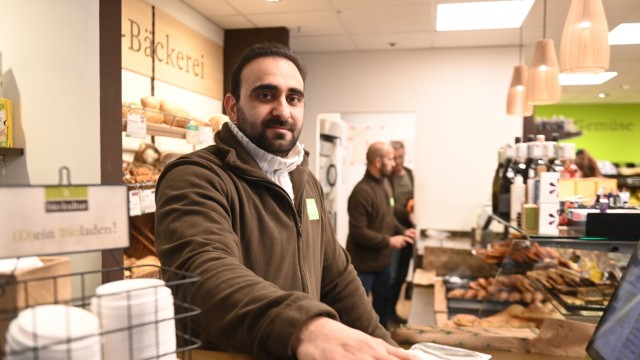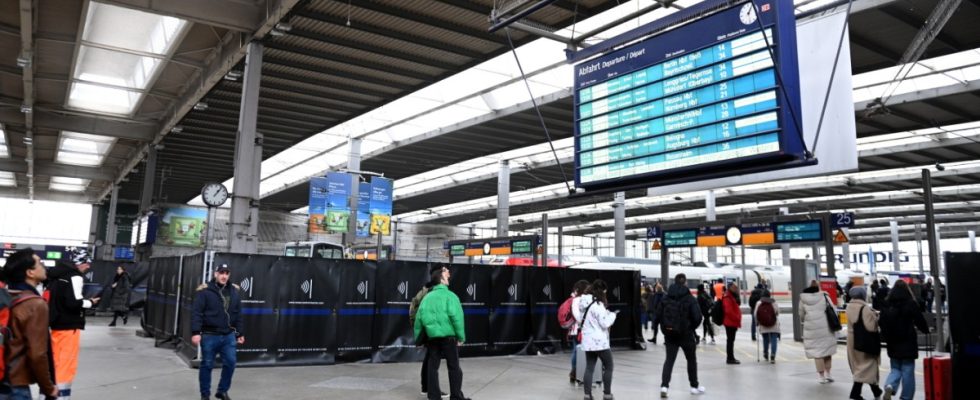Munich Central Station, day three of the rail strike: Since Wednesday, the GDL union has largely paralyzed rail traffic. But despite the strike, there is a lot of activity at the main station. Some trains are at the platforms and the emergency timetable is running smoothly, says Deutsche Bahn. The offer is massively limited, but there can be no talk of a standstill. The S-Bahn trains also run at least every hour, and a train even arrives every few minutes in the main line tunnel.
Nevertheless, there is significantly less going on than on a normal Friday, when weekend commuters usually step on each other’s toes. 450,000 passengers use the main station during normal times. The number of people during the strike is likely to be far away from this. It remains to be seen how crowded it will really be up in the track hall after the strike. The cross platform is now only half as wide due to construction work for the second S-Bahn main line.
Things are also quieter in the shops than usual. The usual queues in front of the checkouts at book and magazine stores cannot be observed in the early afternoon. But the saleswomen don’t want to give any information about how much less busy it is than usual. It’s different at McDonald’s. People come to the main station specifically for burgers and nuggets. The store is full and customers are waiting at the order terminals for their turn.
At the TH Kleen tobacco chain next to the MVG customer center on the way to Bayerstrasse, the strike has not had any major impact on business because, according to an employee, there are fewer walk-in customers due to the location, but there are many regular customers. The other TH Kleen branch on the exit to the S-Bahn, on the other hand, is definitely affected. In addition to cigarettes and cigars, there are also various types of fine whiskey and water pipes that travelers can take with them as souvenirs.
Katarina Valnion has restricted opening hours because of the strike.
(Photo: Stephan Rumpf)
Branch manager Katarina Valnion tells us that about half of the business was lost because of the strike. Currently, her store opens an hour later than usual and closes an hour earlier. She no longer has any understanding for the duration of the strike. “At some point it’s enough,” says Valnion. She has never experienced such a long strike. In your opinion, the negotiating parties should finally approach each other. The strike has consequences for everyone – for the retailers, for the employees who take the train to work, for the supply chains.

Zari Khan’s Biokultur organic food store is also less busy than usual.
(Photo: Stephan Rumpf)
Zari Khan from the organic shop Biokultur also has to travel by S-Bahn; his work starts at six in the morning. “Today I waited for the train for over an hour,” says the Unterschleißheimer, even though he checked the departure times on the app that evening. Even the health food store is only half as busy as usual, says Khan. “That’s no fun.”
The display at the Schweizer Chocolaterie Läderach contains fine chocolates and all sorts of different chocolate bars. Alone: Customers are becoming scarce, as Shaban Shamoselo and his colleagues report. Of the usual 120 customers a day, many from out of town, only around 60 are currently coming.
The long strike, which this time is lasting over the weekend, is also hurting retail in downtown Munich. Friday and Saturday in particular are the most important days of the week for shops and restaurants, says Wolfgang Fischer from the City-Partner corporate initiative. He heard from large trading companies on the first day of the strike that it was the worst day of the year so far. Fischer not only thinks about the sales of the traders and innkeepers, but also about the employees. But some of them have to get home somehow late in the evening, and that is currently difficult.

Wolfgang Fischer from the corporate initiative City-Partner is critical of the strike.
(Photo: Robert Haas)
“We also consider collective bargaining autonomy to be an important institution,” says Fischer. But it bothers him that the railway made an offer and the GDL still called for a strike. In his opinion, collective bargaining in systemically important sectors must be preceded by arbitration or mediation in order to prevent hardening of fronts.
If you don’t live in the city, i.e. in the catchment area of the Munich Transport Company (MVG), you will have to put up with long waiting times at train platforms. Many who can work from home also do so, as MVG spokesman Maximilian Kaltner suspects. According to the MVG control center, there is no increased rush on the means of transport that are otherwise busier during a rail strike. Tram 19 to Pasing or the U5, which connects the Ostbahnhof with the city center and Laim in the west, are a reliable alternative for commuters in the event of train cancellations.

